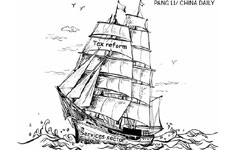The dialectics of China's tax burden
Updated: 2014-03-04 08:22
By Yang Guoying (China Daily)
|
|||||||||||
Finally, although the current tax categories and tax rate designation are aimed at helping low-income groups, law enforcement efforts to collect tax is relatively weak. The tax rate designation, therefore, cannot achieve the desired goal of protecting low-income people's interests.
According to latest official data, more than 90 percent of the tax revenue is paid by companies, but in China, tax evasion has become the latent rule in the world of business, which is to the advantage of high-income groups. An example is inheritance tax. Designed to narrow the income gap, inheritance tax has not been formally collected in China until now.
|
 |
 |
The inadequate fiscal revenue, therefore, had to be complemented by off-budget revenue (mainly levies and charges) and incomes generated from paid land use. This, to some extent, has led to unfair distribution of the macro tax burden.
But a discussion on tax burden could become meaningless and would not lead to any solution if there is no clear point of dispute. So, to solve the problem, government departments should first admit that the tax burden is relatively high.
Second, since the Chinese economy has reached the level of a moderately developed country and infrastructure construction in many places is "complete", the authorities have to largely lower the ratio of investment accounting for fiscal expenditure as soon as possible and then increase the social welfare costs.
Third, referring to the current tax categories, it is necessary to impose property tax and start levying inheritance tax to create conditions for income distribution reform in order to benefit the low-income groups. The authorities should also increase the resource tax rate and impose environmental protection tax to increase their tax revenue and help transform the economic growth pattern.
Fourth, the government should take measures to end the vice of tax evasion. Only then can the tax system be used to protect low-income people and the macro tax burden be shared proportionately by different income groups.
And fifth, the government should decrease the proportion of off-budget revenue and incomes generated from paid land use in its total revenue, and increase the ratio of direct tax to make the public understand more clearly the macro tax burden issue.
In short, whether the tax burden is high or low can be judged only through dialectical thinking, and we need to keep searching for better solutions by deepening the tax reform.
The author is a researcher at China Finance Think tank.
Related Stories
VAT reform exemptions huge in 2013 2014-02-28 16:05
Property tax trials yielding meager results, say analysts 2014-02-19 08:52
Currency tax under consideration: SAFE 2014-01-04 01:53
Workers to pay income tax for annuities 2013-12-07 10:40
Value-added tax reform expands 2013-12-05 00:05
Today's Top News
Last 3 suspects caught in Kunming manhunt
Ukraine crisis hits Poland economy
Geely buys British startup Emerald
CNOOC licensed to seek Arctic oil
CNOOC licensed to seek Arctic oil
G7 leaders condemn Russia over Ukraine
Terrorist group in Kunming attack busted
Political advisers vow to help deepen reforms
Hot Topics
Lunar probe , China growth forecasts, Emission rules get tougher, China seen through 'colored lens', International board,
Editor's Picks

|

|

|

|

|

|





